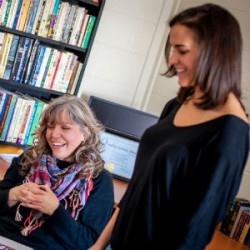
While empowering the women, the storytelling itself also provides important clues about finding access into these hidden communities, identifying the most likely allies within each community, and understanding the complicated choices the women make in seeking or not seeking help.
“Their courage and resilience are breathtaking,” says Stauffer, assistant professor of sociology at Eastern Mennonite University.
Called “Silent Violence,” the project recently garnered a $10,200 grant from The JustPax Fund (TJPX), which focuses on individuals and organizations working for effective change through innovative approaches to societal challenges relating to gender, environmental and/or economic justice. TJPX is administered by Everence Charitable Services through the Everence affiliate, Mennonite Foundation.
Six projects were awarded approximately $58,000 from a pool of 15 applicants, according to Joseph Lapp, managing director at the Harrisonburg Everence office.
“The Advisory Committee believes this project is a positive method of vocalizing the silence around domestic violence,” Lapp said. Upon successful completion of the first-year goals, an additional $7,100 will be awarded to complete the project in its second year.
“Vocalizing the silence” is an important and restorative component of this study, Stauffer says. “We are using a strengths-based approach and want to build on and help surface the assets and resilient strategies these women have been developing. They are obviously surviving and going on with their lives. So what can they teach us about the strategies they are using, and the relationships and social support networks they are building?”
The women’s stories are also helping researchers identify “what we’re calling structural holes,” Stauffer continues. “How are our ideologies or institutions complicit? What are the gaps within the system that these women are falling through? These particular groups of women exist under circumstances where protections and services are less likely to reach them.”
Bridget Mullins is among several master’s level students with the Center for Justice and Peacebuilding who have contributed to the research since the project’s inception. Fluent in Spanish from several years of living in Latin America, Mullins partnered with Cristian Quezada (MA `13 in conflict transformation) to conduct interviews with many of the Latina women. She’s now preparing to conduct interviews within the two other communities.
“My favorite moment during these interviews is the last question,” she said. “That last question is, ‘What advice would you give to women in a similar situation?’ Their voices shine through. You can see them looking with hindsight and realizing how much they have been through, and drawing on their wisdom to communicate hope to other women who might be living through something similar.”
One important goal of the project is social transformation. Some participants have taken part in circle processes to share and reflect on their experiences or in a healing arts workshop facilitated by Cristian and Anita Quezada. Stauffer is also working on other ways to safely share the women’s stories without compromising confidentiality or putting them in danger.
A one-day symposium involving survivor groups, service providers, business, academic, religious and public officials is being planned for next year.
Stauffer notes that the financial commitment from the JustPax Fund is an important affirmation of the need to address micro-level violence and create a place to safely and carefully house these narratives as “sacred stories” of our collective life. She views an arts-based approach as “particularly effective because it unlocks many parts of who we are that would otherwise remain trapped in trauma responses.”
“Our faith tradition is peace-oriented on an international level,” Stauffer says, “and we have focused a lot of time and energy on that kind of macro-violence, but we haven’t been as forthcoming about the violence that is happening within our intimate domains, here at home, and in our communities.
“At the end of the day, if we’re ignoring this type of violence, we’re undermining our peace witness. This project addresses that and helps us see ways that we can surface those stories, validate them and work to address those needs in the families and communities where we live.”
Article by: Lauren Jefferson
Photo by: Michael Sheeler










